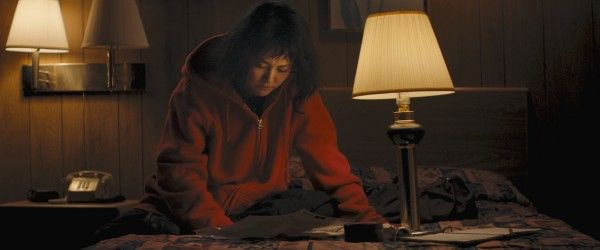If the words “true story” precedes a movie, it’s always misleading. To tell an audience that something is based on a true story is to provide it with greater authenticity; it’s a short cut to making the fictional feel more factual. Of course, not even documentaries are “true stories” since it’s always from a point of view, and just becomes something’s real, that doesn’t make it honest. David and Nathan Zellner’s Kumiko, The Treasure Hunter thoughtfully examines why we need stories to be “true” even though we also crave the fantastical. Unfortunately, the protagonist’s detached nature and baffling choices leave the picture colder than a Minnesota winter.
The movie opens with a blurry VHS footage of the opening titles of Joel and Ethan Coen’s Fargo, which claims “THIS IS A TRUE STORY” followed by more details lending authenticity to the classic movie. We then see Kumiko (Rinko Kikuchi) follow a map, walk into a cave, and unearth an unmarked, damaged, VHS tape. We don’t know how she got to the cave or why the tape was there, but when she plays it, she discovers it’s Fargo, believes the story is real, and that she can find the satchel of money Carl Showalter (Steve Buscemi) buried in the snow. She believes finding this treasure is her destiny, and a welcome respite from the pressures and expectations of Japanese society.
When Fargo was released in 1996, people accepted the “This Is a True Story” card as fact. They had no reason to question it, and eventually they learned that it was done for dramatic effect rather than a disclaimer. Kumiko, The Treasure Hunter is actually based on a true story, but one that isn’t particularly well known, so like Fargo, its effect is dependent on the viewer’s knowledge. Since Kumiko is operating from a place of ignorance, her story is tragicomic. We know the treasure doesn’t exist, so her quest is silly, but she also needs it so badly.
Kumiko is incredibly anti-social. She works in an office, but doesn’t interact with her fellow “Office Girls”, she shies away from an old acquaintance, and mostly keeps her head bowed and shoulders hunched when dealing with other people. Her boss and her mother both ask why Kumiko isn’t either trying to climb the corporate ladder or settling down and having kids. These are the only two options society has for her, so it’s not incomprehensible that she would want to be against this society, and refashion herself as a “conquistador” who will discover a secret treasure in America.
The Zellner Brothers build on this disconnect between Kumiko’s reality and her desires as more pressure is brought to bear on her quest, and her inability to deal with other people becomes even more difficult when a language barrier is introduced. Nothing translates for Kumiko—not fiction to reality, and not her relationship to others. She’s lost, alone, and all she has left is a purpose, which is to find the treasure.
But how she pursues this treasure is where the film begins to fall apart. Although part of the film’s strength is how it blurs the line between fiction and reality without introducing a surreal element, it also creates confusion with regards to how Kumiko pursues her goal. She’s clearly not stupid, but she does dumb things like not knowing how to dress for cold weather. She says that finding the treasure is her “destiny”, but she rarely seems emotionally engaged with it. She clearly prefers the idea of finding buried treasure than being tied down to a crappy job or loveless relationship, but Kikuchi’s performance is so withdrawn and detached that it turns Kumiko into an enigma.
Being based on a true story is a nice hook, but it’s not why people fell in love with Fargo. It’s because the story and characters were compelling and interesting. That’s the “truth” we’re looking for when we go to movies, not a reenactment of actual events. Even though Kumiko’s story really happened, we only care about her journey with regards to how it represents emotional truths we’re willing to accept. By keeping Kumiko emotionally distant, the film is as valuable as a fictional satchel of money.
Rating: C
Click here for all of our Sundance 2014 coverage, and click on the corresponding links for my reviews:
- The Babadook
- Blue Ruin
- Boyhood
- Calvary
- Cold in July
- Frank
- God’s Pocket
- The Guest
- Hellion
- Ivory Tower
- Laggies
- Lilting
- Locke
- Love Is Strange
- The Raid 2
- Whiplash
- Young Ones
And click on the corresponding links for Adam’s reviews:



